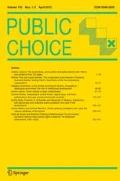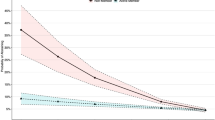Abstract
This study presents a political model whichsuggests that monopoly legislators form cartel-likeorganizations (referred to as ``memberships'') in aneffort to extract greater benefits in the politicalprocess. Based on a model by Coker and Crain (1994)that provides theoretical and statistical argumentsfor congressional committees as loyalty-generatinginstitutions, the instant research examines committeeplacement of ``members'' of the Congressional BlackCaucus (CBC) in the U.S. House by Democrat leaders.Voting records indicate that the CBC is uniform in itsvoting patterns, indicating cartel-like behavior.Because of this, the Democratic leadership in theHouse chooses to place CBC members on importantcommittees in order to support their policy agenda.The general finding of this study is that ``blackrepresentation'' may be greater than simply theproportion of seats held by black Representatives."Legislators differ substantially by virtue of their committeeassignments. Committees in Congress, and particularly in theHouse of Representatives, possess disproportionate power over thepolicy areas in their respective jurisdictions, have the rightto hold hearings, and recommend budget allocations for ...bureaus ..." (Grier and Munger, 1991: 25)
Similar content being viewed by others
References
Alvarez, R.M. and Saving, J.L. (1997). Congressional committees and the political economy of federal outlays. Public Choice 92: 55-73.
Coker, D.C. and Crain, W.M. (1994). Legislative committees as loyalty-generating institutions. Public Choice 81: 195-221.
Crain, W.M. and Ekelund, R.B. Jr. (1978). Deficits and democracy. Southern Economic Journal 44: 813-828.
Grier, K.B. and Munger, M.C. (1991). Committee assignments, constituent preferences, and campaign contributions. Economic Inquiry 24: 24-43.
Groseclose, T. and Stewart, C. III (1998). The value of committee seats in the House, 1947–1991. American Journal of Political Science 42: 453-474.
Hall, R.L. and Grofman, B. (1990). The committee assignment process and the conditional nature of committee bias. American Political Science Review 84: 1,149-1,166.
Krehbiel, K. (1990). Are congressional committees composed of preference outliers? American Political Science Review 84: 149-163.
Kroszner, R.S. and Stratmann, T. (1998). Interest-group competition and organization of Congress: Theory and evidence from financial services political action committees. American Economic Review 88: 1,163-1,187.
Mixon, F.G. Jr. and Upadhyaya, K.P. (1997). Gerrymandering and the Voting Rights Act of 1982: A public choice analysis of turnover in the U.S. House of Representatives. Public Choice 93: 357-371.
Regens, J.L., Elliott, E. and Gaddie, R.K. (1991). Regulatory costs, committee jurisdictions, and corporate PAC contributions. Social Science Quarterly 72: 751-760.
Shepsle, K.A. (1978). The giant jigsaw puzzle: Democratic committee assignments in the modern House. Chicago, IL: University of Chicago Press.
Smith, S.S. and Deering, C.J. (1990). Committees in Congress (2nd edition). Washington, D.C.: Congressional Quarterly Press.
Stigler, G.J. (1964). A theory of oligopoly. Journal of Political Economy 72: 44-61.
Author information
Authors and Affiliations
Rights and permissions
About this article
Cite this article
Mixon, F.G., Ressler, R.W. Loyal political cartels and committee assignments in Congress: Evidence from the Congressional Black Caucus. Public Choice 108, 313–330 (2001). https://doi.org/10.1023/A:1017560923687
Issue Date:
DOI: https://doi.org/10.1023/A:1017560923687




